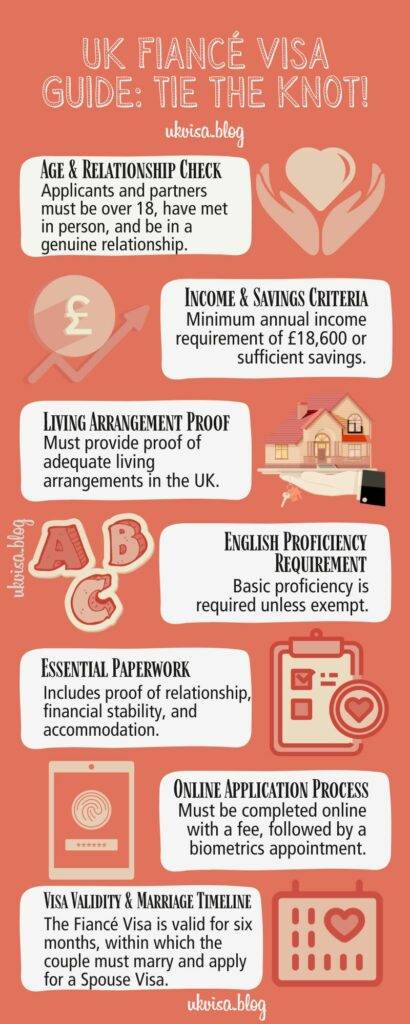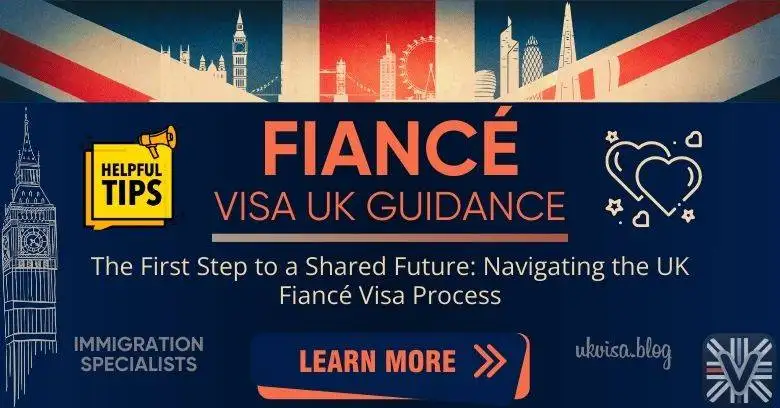Fiancé Visa UK Requirements 2024: A Comprehensive Guide! The UK Fiancé Visa in 2024 is a pivotal step for couples planning to marry and settle in the UK. This guide comprehensively covers the essential criteria, documentation, and application process for the visa. It also addresses the transition to the Spouse Visa route post-marriage. Understanding common refusal reasons and how to avoid them is crucial for a successful application. Designed to provide clear and concise information, this resource aims to simplify the complexities of the Fiancé Visa process, helping applicants confidently navigate towards a successful union in the UK.
Table of Contents
1. Fiancé Visa UK: Overview and Eligibility
Navigating the UK immigration system can be daunting, especially for those seeking a Fiancé Visa. This comprehensive guide aims to demystify the requirements and process of obtaining a UK Fiancé Visa, crucial for couples planning to marry in the UK. We will delve into eligibility criteria, application procedures, necessary documentation, and common reasons for refusal, helping applicants to successfully navigate their journey towards marrying their loved one in the UK.
The UK Fiancé Visa, or Prospective Marriage Visa, is a temporary route for non-EEA nationals to enter the UK to marry a British citizen or settled partner. It provides a 6-month stay, during which the couple is expected to marry and then apply for a Spouse Visa.
Eligibility Criteria for a UK Fiancé Visa
- Age Requirement:
- Both partners must be at least 18 years old.
- Relationship Authenticity:
- The couple must have met in person and be in a genuine relationship. Evidence includes communication records, photographs, and travel documents.
- Marriage Intention:
- Intent to marry within the 6-month validity of the Fiancé Visa.
- Partner’s Status:
- The UK partner must be a British citizen, settled in the UK, or have refugee status/humanitarian protection.
- Financial Requirement:
- Annual income of at least £18,600 or sufficient savings. There is an increased requirement for dependent children.
- Accommodation:
- Suitable accommodation must be available in the UK, evidenced by tenancy agreements, mortgage statements, or letters from the property owner.
- English Language Proficiency:
- Basic knowledge demonstrated by passing an approved English test at A1 level or higher, or exemption through academic qualifications or nationality.
Meeting these criteria is essential to avoid fiancé visa refusal. This guide will provide detailed insights into each aspect, ensuring applicants are well-prepared for a successful application.

2. Required Documents for a UK Fiancé Visa Application
Ensuring you have all the necessary documentation is critical for a successful UK Fiancé Visa application. Below is a detailed breakdown of the types of documents required:
Proof of Relationship:
- Communication records (emails, texts, social media exchanges).
- Photographs together at various events and locations.
- Travel itineraries or tickets to prove in-person meetings.
- Letters of support from friends and family.
Financial Documents:
- Recent payslips or salary statements (last six months if employed).
- Bank statements for income and savings verification.
- Employer’s letter confirming employment and income.
- Tax returns or business accounts (for self-employed applicants).
- Proof of other income sources (rental, pension, etc.).
Accommodation Evidence:
- Tenancy agreement or mortgage statement of the UK partner’s property.
- Letter from the property owner (if living in their property).
- Property inspection report or floor plan to demonstrate space and safety standards.
English Language Certificates:
- Certificate from an approved English test at A1 level or higher.
- Degree certificate or transcript (if the degree was taught in English).
- Letter or document proving exemption based on nationality (for majority English-speaking countries).
3. UK Fiancé Visa Application Process
Applying for a UK Fiancé Visa involves several key steps, each crucial for ensuring a successful application. Below is a detailed overview of the process:
- Document Preparation:
- Gather all required documents. Ensure they are up-to-date and translated into English by an accredited translator if necessary.
- Online Application:
- Create an account on the UK Visas and Immigration (UKVI) website and fill out the application form thoroughly.
- Payment of Fees:
- Pay the visa application fee. As of May 28, 2024, the fiancé visa fee is £1,846 (subject to change – verify on the UKVI website for current fees).
- Biometric Information Appointment:
- Book and attend an appointment at a visa application center (VAC) to submit your biometric information (fingerprints and photograph) along with your documents.
- English Language Test:
- If required, take an English language skills test at an approved center.
- Application Submission and Wait Time:
- Submit your application and wait for a decision. Processing times vary from 2 to 12 weeks, depending on various factors like application completeness and country of application.
- Expedited Processing Options:
- Consider priority services for faster processing at an additional fee of £500. Note that expedited processing times are not guaranteed.
4. From Fiancé Visa to Spouse Visa: The Transition
Transitioning from a UK Fiancé Visa to a Spouse Visa involves specific timelines and requirements. Within the six-month validity of the Fiancé Visa, couples must marry or form a civil partnership in the UK and then apply to switch to a Spouse Visa. Below is a breakdown of the essential steps and requirements for this transition.
Transition to Spouse Route
- Timeline:
- Marry or enter a civil partnership within the six-month Fiancé Visa period. Apply for a Spouse Visa afterwards while in the UK.
- Evidence of Marriage/Civil Partnership:
- Provide a valid certificate to confirm the formalization of your relationship.
- Genuine Relationship:
- Demonstrate the authenticity of your relationship, such as through shared financial responsibilities or joint property ownership.
- Financial Requirement:
- Show a combined annual income of at least £18,600, plus additional for any children (£3,800 for the first child and £2,400 for each additional child).
- Accommodation Requirement:
- Provide evidence of adequate accommodation in the UK, like a rental agreement or mortgage statement.
- English Language:
- If previously met for the Fiancé Visa, no further evidence is needed unless circumstances have changed. Otherwise, an approved English test may be required.
- Application Process:
- Complete the FLR(M) form, pay applicable fees, and submit necessary documents. Standard processing takes about 8 weeks, with faster options available for an additional fee.
This guide aims to streamline the process for applicants transitioning from a Fiancé Visa to a Spouse Visa, outlining the key steps and requirements to ensure a smooth and successful transition.
5. Reasons for Refusal and How to Overcome Them
Navigating the UK Fiancé Visa application can be challenging, but understanding the common pitfalls and following the right approach can significantly increase your chances of success. We’ve identified key reasons for visa refusals and provided solutions and tips to help you prepare a robust application.
Common Refusal Reasons
1. Insufficient Documentation:
- Solution: Provide complete and correct documentation, covering all aspects of your relationship, financial status, and accommodation. Double-check for completeness and accuracy.
2. Failing Financial or Accommodation Requirements:
- Solution: Ensure you meet the financial and accommodation criteria by providing evidence of income, savings, and suitable living arrangements.
3. Inadequate Evidence of a Genuine Relationship:
- Solution: Submit comprehensive proof of your relationship, including photographs, communication records, and evidence of joint financial responsibilities.
Tips to Avoid Refusals
- Thoroughly Read the Guidance:
- Familiarize yourself with the UK Fiancé Visa requirements and application process to avoid common mistakes.
- Provide Complete and Accurate Documentation:
- All required documents should be submitted accurately and be up-to-date.
- Seek Professional Advice:
- If uncertain about any application aspect, consult with a qualified immigration adviser.
- Prepare for the Interview:
- Be ready to discuss your relationship, finances, and future plans, ensuring consistency with your application.
Conclusion
Throughout this guide, we have delved into the intricacies of the UK Fiancé Visa, covering everything from key requirements and documentation to transitioning to a Spouse Visa and addressing common visa refusals. By adhering to the guidance provided, you can enhance your prospects of a successful application.
The success of your UK Fiancé Visa application hinges on meeting the requirements and providing accurate, comprehensive documentation. Dedicate ample time to thoroughly prepare your application and consider seeking professional advice for any uncertainties. Good luck with your application, and we hope this guide helps you on your journey to starting a life with your partner in the UK.
6. FAQs: UK Fiancé Visa Requirements
-
What is the usual processing time for a UK Fiancé Visa?
Processing times vary but generally range from 2 to 3 months. Factors influencing this include the country of application and case complexity. Expedited processing may be available for an additional fee.
-
Am I allowed to work in the UK on a Fiancé Visa?
Holders of a Fiancé Visa are not permitted to work in the UK. Employment rights are granted once you transition to a Spouse Visa.
-
How long does a Fiancé Visa remain valid?
The visa is valid for six months, during which you should marry and apply for a Spouse Visa.
-
What should I do if my relationship ends before marriage?
If the relationship dissolves before marriage, you must notify the Home Office and depart the UK, as the visa conditions would no longer be met.
-
Is it possible to extend a Fiancé Visa?
Extensions are typically not granted. The expectation is to marry within six months, barring exceptional situations like illness or travel restrictions.
-
Can my children accompany me on a Fiancé Visa?
Yes, dependent children under 18 can be included in your application, subject to meeting the necessary criteria.
-
Can I apply for a Fiancé Visa while in the UK?
Fiancé Visa applications must be made from outside the UK, in a country where you have citizenship or valid long-term residence.
-
Does time on a Fiancé Visa count towards Indefinite Leave to Remain (ILR)?
Time on a Fiancé Visa does not contribute towards the ILR eligibility period. Eligibility for ILR under a partner route requires 60 months of continuous leave, excluding any time on a Fiancé Visa.
-
Can I re-enter the UK on a Fiancé Visa after getting married?
Post-marriage, re-entry is allowed within the visa’s validity, provided you show intent to regularize your status and present the marriage certificate.
-
Are extensions for Fiancé Visas possible in certain circumstances?
In exceptional cases where the marriage is delayed, a six-month extension may be granted, provided there’s evidence that the marriage will occur within this period. This extension prohibits employment and access to public funds.
This FAQ section offers answers to common questions about the UK Fiancé Visa, enhancing understanding for applicants. For further details relating to UK fiancé visa requirements please refer Gov.UK Appendix FM Immigration Rules.

